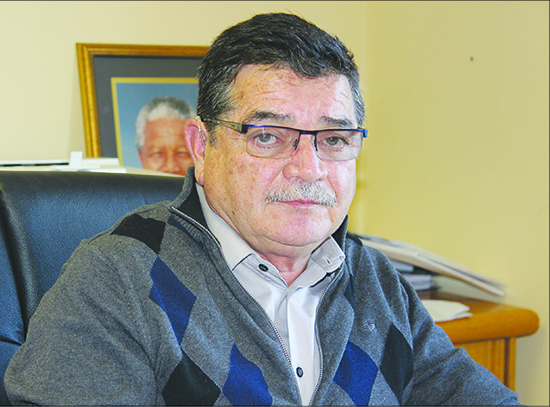ONE of the highest paid civil servants and a darling of the Swapo Party says his N$3 million per year salary is a downgrade from what he earned in South Africa.
Gabriel Castro, adviser to the Minister of Regional and Local Government and Housing and Rural Development, Charles Namoloh, was brought in by the government to help steer the country’s ambitious mass housing programme.
Castro says he came back to help steer the project and not to make money.
The ministerial mass housing expert made the remarks in an interview with The Namibian on Friday about his connection to Namibia, the trust he enjoys from the Swapo Party leadership and his earlier stint as chief architect of the mass schools in 1991.
The Chilean-born turned Swedish citizen was at the receiving end of a media report last month which wrote about his N$3 million per year salary for a two-year contract which translates to N$250 000 per month including housing, transport and medical aid contribution.
The architect maintains that he took a 15% pay cut from his previous job as senior developmental officer in South Africa, a job he started in 2012.
“They [Namibian government] offered me a five-year contract but I said no, I just want two years. I am going to retire but I would like to help with this big boat [mass housing] to go
in the right direction,” he said. Castro took the job last year.
“I left my contract, better paid than here. I have a good salary here. I won’t deny that, but I could have stayed in South Africa if it was for the money,” said Castro who turns 65 in September this year.
“I left [South Africa] because of my political and emotional link to Namibia. I left for less money but with more hope to finish my working life for the commitment made during the struggle,” he said.
Castro was seconded to Namoloh in mid last year by President Hifikepunye Pohamba who asked him to provide advice on the mass housing programme. They agreed to give Castro a permanent job.
THE MIDDLEMAN
There has been an outcry from the public on the role of some of the well-connected companies that won the mass housing tenders as people claimed that they do nothing other than sub-contracting the work to others who do the actual work. Twenty-five companies were awarded the tenders.
Even though he refused to comment on this, Castro has been one of those who have been opposed to the way the tenders were issued which made him unpopular with the NHE management.
“We should cut out the middleman as it does not add any value to what we are doing because it cost a lot. There are people making money for doing nothing,” Castro said.
He concedes that the middleman firms are a result of a political decision aimed at empowering indigenous people but said the practice is pointless if government does not monitor real progress.
“The government should motivate and facilitate the participation of younger Namibians with the aim of building capacity and not to enrich people in a very short time,” he said.
Castro also spoke about a good example of capacity building of the mass housing project in Keetmanshoop which is currently training women to be constructors.
COMRADES CONNECTION
Castro met Pohamba, who was secretary for Swapo at Nyango refugee camp, when Pohamba was in contact with a Swedish agency helping liberation struggle organisations. Swapo poached Castro from Tanzania where he was building houses for exiled ANC refuges for a decade.
Castro’s connection to Swapo is not only remembered for his contribution to houses in exile. He saved Namoloh’s son after he had been bitten by a snake in Zambia about 27 years ago.
Swapo’s trust in Castro continued after independence in 1990. Defence minister Nahas Angula, who was the first education minister, brought Castro from Zambia to help build what was called mass schools in Namibia in 1991.
Castro said 78% of pupils were learning from under trees when he started, but that number changed drastically to 78% learning under roofs when he left in 1997.
Castro says he is proud he decided in the 90s to make a uniform design for schools which is still being used now. He has worked on low-cost housing projects in 14 countries including South Africa, Zambia and Kenya.
According to his CV, Castro’s key qualification is in Urban Development and low cost building as well as monitoring, planning, local infrastructure, housing and building over 20 years.
Some of Castro’s suggestions have made him unpopular, especially with the custodian of the mass housing programme and some constructors, but the architect believes that he has worked in several low-cost housing programmes and he is only trying to steer the project in the right direction.
In an age of information overload, Sunrise is The Namibian’s morning briefing, delivered at 6h00 from Monday to Friday. It offers a curated rundown of the most important stories from the past 24 hours – occasionally with a light, witty touch. It’s an essential way to stay informed. Subscribe and join our newsletter community.

The Namibian uses AI tools to assist with improved quality, accuracy and efficiency, while maintaining editorial oversight and journalistic integrity.
Stay informed with The Namibian – your source for credible journalism. Get in-depth reporting and opinions for
only N$85 a month. Invest in journalism, invest in democracy –
Subscribe Now!









